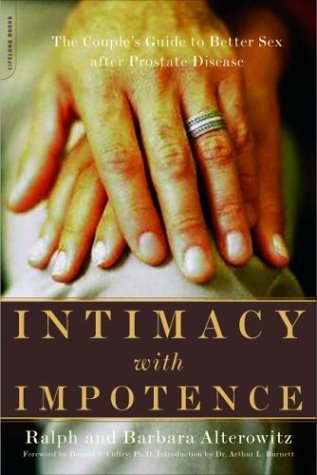|
Receiving a diagnosis of cancer is upsetting enough, but finding out it's prostate cancer is a double whammy say survivors, therapists and doctors alike. The trouble is that removing prostate cancer usually poses another problem - impotence.
While men don't worry about the side effects of treatment initially, it often becomes an issue afterwards.
"Even with nerve-sparing surgery, most men who undergo a prostatectomy [removal of prostate] become functionally impotent," Toronto medical oncologist Ian Tannock explains. "Radiotherapy doesn't damage the nerves immediately, however most of those men experience impotence after two years. Men on hormone therapy also lose their sex drive and become impotent. Virtually all treatments lead to impotence."
Ralph Alterowitz , co-author of Intimacy vs Impotence: A Couple's Guide to Better Sex after Prostate Cancer, says it strikes at the very essence of masculinity. "Men have said to me, 'I'm not a man anymore. I can't get an erection. What good am I?' One guy said to his wife, 'You might as well take me out to the barn and shoot me.' They don't define themselves as a man anymore."
Self-image problems
Norm Oman, a prostate cancer survivor who runs a support group in Winnipeg, agrees. "It bothers men a lot because many of us see ourselves as our maleness. Anything that diminishes it is a concern. Guys grow up thinking their bodies are life support systems for their penises, so anything that threatens that has an impact, regardless of how potent they were before the surgery. We're pretty insecure people to begin with and it doesn't make it any better. Often their wives say they're happy the men are alive and not to worry that the sex is gone, but the men don't necessarily believe them."
Quote
'It bothers men a lot because many of us see ourselves as our maleness. Anything that diminishes it is a concern."
- Norm Oman, prostate cancer survivor
Dr. James Talcott of Massachusetts General Hospital who co-authored a 2001 study on prostate cancer says the impotence has far reaching effects on mens' lives. "There's an element of seduction in every interaction between men and women. In our study, before diagnosis men might have considered sexual intimacy as a possibility - now it was out of the question. Men worried about being full participants in society."
The study also found men lost their fantasy sex lives because they couldn't imagine themselves as potential sexual partners. He says the loss of that made them very sad. Some even worried that they weren't complete men anymore.
Face the facts early on
It's something men need to think about when they receive a diagnosis says Dr. Talcott. And it's also something doctors need to be aware of.
"Physicians should consider these effects when advising men of their treatment options. As well, for men who have undergone the treatment, doctors should address these psychosocial issues when counselling men."
Dr. Tannock agrees: "A lot of men don't realize that the chance of dying of prostate cancer may be very small and having treatment for it may make little difference to that chance, but they want treatment because they have cancer. Some people think quality of life becomes secondary when you're treating cancer. There are situations where the treatment doesn't change their outcome very much and they might have kept their potency."
For those who have chosen treatment and lose potency, it doesn't mean the end of a sex life. There are a number of enhancements on the market in the form of drugs, injections, and vacuum pumps.
However, Alterowitz says the pills don't work if you're not aroused. He also says both partners have to view sex not just as sex, but lovemaking.
"Often as men age there's not a lot of sex in the relationship anyway," he says. "All of a sudden they panic and think they won't be able to do it, but in fact they haven't been able to for some time. They've put so much stock in performance, that most of them don't know how to make love."
When men focus on making love rather than performance, it can actually have an unexpected benefit, Alterowitz says. "We've had a number of people tell us, sex was never as good as it is today."
DOWNLOAD - click this icon
to open a printable version of this article

return to top | 
 ISBN:
0-7382-0789-6
ISBN:
0-7382-0789-6![]()
![]()
